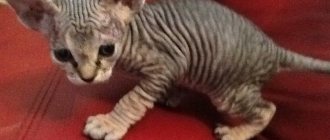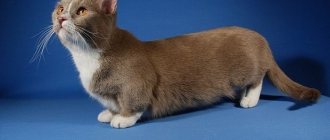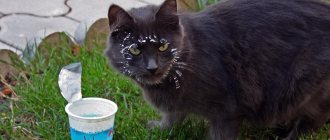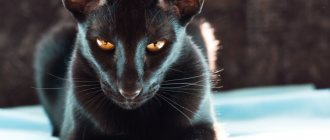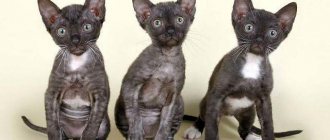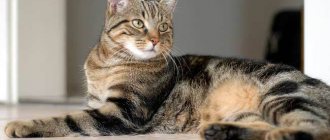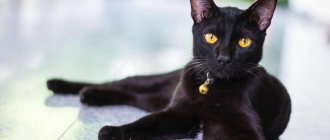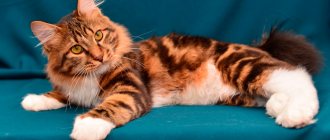How long do British cats live? How to extend the life of a purebred pet? Proper care for an old cat. Stories of happy centenarians.
British cats are graceful, elegant and intelligent. Their body is large, they are stocky and vary in size from medium to large. Female cats can be distinguished by their more graceful build and weight up to 4 kg, while female cats grow to 9 kg or more.
The British have some of the best traits. When you look at them, tenderness and a touching smile appear. Their plump face with a flattened nose is a signature feature of the breed, which they inherited from Persian cats.
The fur of British cats is stuffed with a dense undercoat. They do not require special care. They shed no more than other short-haired relatives. There are many standard colors in the breed. The most popular ones are blue, striped and with white spots.
Despite their cute appearance, such cats have a sense of self-esteem and do not bother you with their presence. They find something to do on their own and get along with other pets without any problems.
They are not picky about food, but they have an excellent appetite. There are individuals with a tendency to gain excess weight and allergies, especially if they have light or completely white fur.
The breed is recognized by the largest felinological organizations. Their standards are largely similar, only the nuances in evaluation and definition of colors differ.
British cats were bred from the Scottish Fold breed. Until recently, they could be crossed with each other. A separate breed of British longhair cats has also appeared.
How long do British cats live at home?
When choosing a pet, consider its lifespan. British breed cats live up to 19 years. This is a quarter of a person's life. Consider whether you are ready to take responsibility for an animal for a long time. Proper care of a British cat requires attention, time and financial investment .
So that in a few years you don’t have to look for new owners for the animal, study the rules of caring for the British and evaluate your capabilities before purchasing a kitten.
The British breed is resistant to cancer. However, representatives have many weaknesses. The British are prone to obesity, diseases of the gastrointestinal tract, heart and blood vessels. Obesity creates increased stress on bones and joints, which leads to pathologies. Many representatives of the British breed are diagnosed with liver and kidney diseases.
There is a scientifically proven connection between the color of the British cat and the tendency to diseases. Britons with exotic colors are more likely to get sick and live shorter lives. This is due to genetics. Unusual colors are transmitted through recessive genes. They are linked to other genes responsible for health status and are inherited together. Therefore, kittens with unusual colors have an increased tendency to disease.
Factors that influence the age of a pet
This breed is very beautiful and such pets, as a rule, are kept to participate in various competitions or to breed new offspring. Such pets do not survive on the street, as they are gentle and very domestic creatures . British cats live best at home and with proper care.
The following factors influence how long British cats live:
- genetic predisposition to certain diseases;
- living conditions of a cat;
- food;
- the presence of stress.
We recommend reading: The Cat Yells At Night And During The Day While Sleeping
The British have a well-developed immune system by nature, but nevertheless, they are susceptible to some diseases. Diseases can be transmitted from other felines or even from people.
Living on the street significantly shortens an animal's lifespan. It is also reduced by stress, infections, cat fights and bad food. Oncological diseases are not typical for this breed.
How to extend the life of an animal
How long British cats live depends on their owners. An animal with ideal genetics can die early due to improper care. But it won’t live on the street for even 5 years. Vitality, strength of the immune system, and psychological well-being depend on the content. By creating good conditions for your pet, you can significantly extend its lifespan.
Diet
A balanced diet increases the length and quality of life.
Britons are prone to obesity. You should limit the amount of fat. Overfeeding your pet is strictly prohibited. But animals have a good appetite. They may often demand that the bowl be filled. If the owners cannot refuse and begin to pamper the pet, the animal quickly gains excess weight.
The basis of the diet should be premium and super-premium food. The best option is food created for the British breed (marked “Brit”). On the packaging of any food there are instructions for calculating portions. Do not overfeed the animal; carefully calculate the diet.
Buying cheap food from the mass market shortens the life of your pet.
The composition of cheap feed is not balanced. It cannot meet the animal's needs for vitamins and microelements. Prohibited foods include pork, which is very difficult to digest. River fish are prohibited because of their small bones, which are easy to choke on. Milk is allowed for kittens up to 6 months, but not for adults .
A British cat should be fed twice a day. The diet should not include ready-made food from the human table. This is fraught with obesity and the development of problems with the digestive system. The list of permitted human products is very short:
- lean types of meat;
- lean sea fish;
- egg yolks;
- low-fat kefir and cottage cheese;
- porridge, except oatmeal and semolina;
- premium baby food.
Keep in mind that the British have a short muzzle. They can only grab small pieces of meat. A balanced diet includes 70% dry food and 30% wet food. Make sure that the drinking bowl does not remain empty. Change dirty water promptly.
Many owners disagree with these rules. Sometimes people feed animals table food or cheap food. And they say that even without food restrictions, the British live a long time. This opinion is wrong.
If a cat lived 15 years on a poor diet, it could live up to 19 or 20 years on a good diet.
Hygiene
- A British cat should be brushed every day. Otherwise, the stomach will become clogged with clumps of wool.
- Once a month you need to trim your nails. But complete declawing is unacceptable.
- The eyes should be cleared of pus every week or more often if necessary. Cleaning is done with a cloth soaked in warm water.
- The ears should be cleaned once every 2 weeks. A cotton wick is used for this purpose.
- You need to brush your teeth 1-2 times a week. Regular brushing prevents possible problems with teeth and gums.
- Beds, bowls and trays should be cleaned when they become dirty.
Physical activity
A healthy animal needs space to be active. The cat needs a spacious walk. It is harmful to lock it in a confined space. This leads to muscular dystrophy and excess weight gain. Obesity creates additional stress on the cardiovascular system. This leads to accelerated wear and tear of the body. But you can’t walk a cat on the street, it’s dangerous for the animal. The animal should be given enough space inside the house or apartment.
Disease Prevention
To prevent some diseases you need to get vaccinated. You can obtain a schedule of mandatory vaccinations at your veterinary clinic. Timely vaccinations protect against the following diseases:
- rabies;
- panleukopenia;
- calcevirosis;
- rhintracheitis;
- chlamydia and lichen.
Some cat diseases are common to humans and animals. The life of the pet and the well-being of the family depend on compliance with the vaccination schedule. Britons under 8 years old should visit a veterinarian at least once a year, over 8 years old - 2 times a year. If any signs of illness appear, contact your veterinarian immediately. Diseases do not go away on their own, but progress over time.
Castration (sterilization)
Spayed and neutered cats live longer. If you own a non-breeding animal, surgery should be performed. This will help preserve the dignity of the breed, extend the life of the pet, and solve the problem of unplanned offspring. Optimal age for the procedure: 7–8 months.
The operation prolongs life by an average of 2–3 years.
A well-performed operation does not have negative health consequences. The harm of castration or sterilization is a myth. Such rumors arise after contacting unqualified surgeons. Either due to improper care after castration or sterilization.
Psychological well-being
The British are stressed . The animal should be protected from unpleasant experiences. These include walking on the street, being left alone, and being in contact with many strangers. But visits to the veterinarian, vaccinations and surgeries are necessary procedures that should not be neglected.
For your pet’s psychological well-being, you need to communicate and play with it often. Britons can remain active into old age. The behavior of adult animals often resembles that of kittens. If the owner ignores the cat, it becomes passive and lazy. And the time spent with a person, his attention and love received, extend the life of the pet.
Much does not mean good
What’s strange is that your excessive care and love for a short-haired animal can also shorten its life. Owners of such animals very often pamper their pet with a variety of treats and protect it from external factors.
The reason for this is overeating, which does not in any way affect the good health of the pet. As for protection from external factors, this can reduce the pet’s immunity and lead to various diseases.
© shutterstock
Regarding reproductive functions, they also affect how long your cat or your female will live. always live much shorter than ordinary pets . And food! It plays a huge role in this topic!
Caring for an Old British Cat
Old British cats need special care. Cats age earlier than you might think. The first signs of aging appear at the age of 8–9 years. From this time on, the pet requires special care. Although outwardly aging may not be noticeable. The animal can remain active. However, the processes occurring in the body begin to gradually slow down.
Rules for caring for old animals:
- Reduce the amount of fat in your diet.
- Reduce stress.
- Create a calm environment for relaxation.
Animals over 8–9 years old should be seen by a veterinarian more often. Many diseases have a latent phase, when the pathological process has already begun, but symptoms have not yet appeared. If you detect a disease at an early stage, you can cure it faster and cheaper.
Extreme old age in British cats begins at 12–13 years of age. At this age, many animals develop senile pathologies: deafness, loss of incisors, eye diseases. Elderly cats should be examined frequently by a veterinarian and receive prescribed treatment and good care.
How old can British cats live to?
As for specific figures, British cats, on average, live about 13-15 years, but if certain conditions are created for these animals, they can live up to 18-20 years.
In general, no matter how paradoxical it may sound, the life expectancy of a British cat can be greatly reduced due to excessive care of the owners.
The fact is that many people, trying to please their pet, “feed” them with all sorts of tasty, but very harmful foods, which in turn negatively affects the health of the animal, which leads to their early death.
Sterilization of an animal also affects life expectancy. For example, British cats, which are deprived of the opportunity to have offspring, live two to three years longer than these representatives of the fauna with preserved reproductive abilities (the fact is that sterilized cats are less susceptible to cancer).
The life expectancy of an animal is also noticeably reduced due to poor care and unbalanced nutrition.
Those representatives who live indoors, but have the opportunity to exercise physical activity (running, jumping, that is, special complexes are equipped for them), breathe fresh air every day, and also eat food with sufficient nutrients, are likely to live to an old age much higher.
If you want your cat to please you for as long as possible, then take the time to create a comfortable existence for her:
- visit the veterinarian once every six months,
- feed in a timely manner, but do not overfeed,
- do not expose the animal to stress, as this representative of the fauna requires a quiet life, moderately active.
Record holders among cats
If we compare breeds, the record holders will be Siamese cats. The average age of animals of this breed is 20 years. But the world record holders are cats of an unknown breed (mixed breeds).
Spike the cat lived for 30 years in an English village. Already at the ripe old age of 19, he was seriously injured by dogs. However, the cat successfully completed a course of treatment and rehabilitation, and became a famous long-liver.
The world record belongs to a cat named Ma. The breed of this cat is unknown. She was probably mixed race. Ma lived in the English town of Drewsteignton for 34 years . Until her last days, she was active and caught mice.
Did you like the article?
Food size
This is due to the small jaw size of cats. Smaller food is simply easier for them to chew. If you can't find small food, you can buy wet food. But remember that the food, as we wrote above, must only be from an expensive and reputable company. Such manufacturers include in their products the very vitamin minerals, proteins and meat that your pet needs.
Since we have already remembered the topic of vitamins, we need to consider it in more detail. There are a lot of vitamins, and they differ only in their varieties, namely: vitamins for castrated animals, vitamins for strengthening teeth and bones, and so on.
Just like people take medications, you should always consult your veterinarian before purchasing vitamins for your pet! He will advise you on the best vitamins.
By following all the above tips, you can increase the life expectancy of British cats at home.
Features of the British and the result of our information article
- such pets need a calm and measured life, without unnecessary stress;
- mutations and genetic diseases are not typical for this breed;
- cancer does not stick to the British;
- castrated pets live less than full-fledged relatives of the breed;
- excessive love can reduce the life expectancy of a pet;
After all of the above, we can say that how long British cats live depends on the literacy of the British owner. Read useful information, properly care for your pet, and he will delight you and your family for a long time!
By following all the above tips, you can increase the life expectancy of British cats at home.

